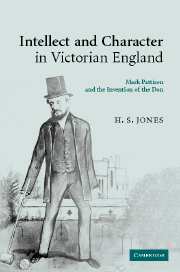2 - ‘Into the abysses, or no one knows where’
from PART I - LIVES
Published online by Cambridge University Press: 02 March 2010
Summary
At the point that the Essays and Reviews controversy broke, Thomas Hughes's novel, Tom Brown at Oxford, sequel to the more famous Tom Brown's Schooldays, was in the midst of being serialized by the recently founded monthly, Macmillan's Magazine. Hughes had been an undergraduate at Oriel a decade after Pattison, and he set the novel in the 1840s. He recounts a conversation between his hero and a puzzled young woman who asks which is worse: a Tractarian or a Germanizer. Tom Brown has no doubt of the answer:
The Germanizer, of course … because one knows the worst of where the Tractarians are going. They may go to Rome, and there's an end of it. But the Germanizers are going into the abysses, or no one knows where.
Pattison had been a Tractarian, but had narrowly avoided going to Rome. For many of his critics, the course of the remainder of his life vindicated Tom Brown's view that the fate of the Germanizing rationalist was far worse. Towards the end of his life Pattison was sometimes inclined to that view himself, but that was hardly how things would have seemed to him in the early 1860s. In the midst of the controversy over Essays and Reviews, he would win the prize that had been denied him a decade previously.
THE PRIZE: ELECTION TO THE RECTORSHIP
It is curious that whereas Pattison's Memoirs dwell to an inordinate extent on the events of October and November 1851, they tell us nothing at all of his election to the rectorship in January 1861.
- Type
- Chapter
- Information
- Intellect and Character in Victorian EnglandMark Pattison and the Invention of the Don, pp. 64 - 103Publisher: Cambridge University PressPrint publication year: 2007



